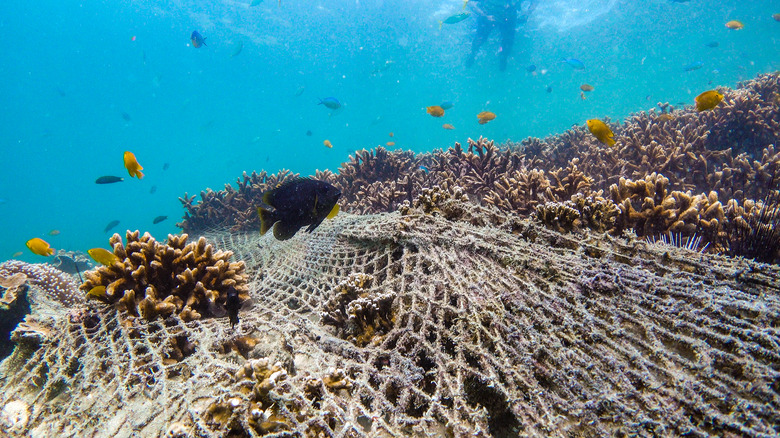The Destruction Of The Marine Ecosystem
The marine ecosystem is under severe stress; in many areas the conditions necessary to sustain life are either in jeopardy or nonexistent. The destruction of marine habitats is especially prevalent along coastlines where human populations have increased. Habitat loss, pollution, overfishing, unsustainable fishing practices and global warming are all contributing factors in the degradation of marine habitats and ecosystems.
Destruction of Coastline Habitats
Destruction of Coastline Habitats
Habitat loss, pollution, runoff and increased salinity are causing ocean habitat destruction of coral reefs, sea grasses and other habitats for birds and fish. As coastal wetlands are filled in to accommodate growing human populations, the damming of rivers decreases the flow of freshwater, slows nutrient runoff and inhibits fish migration.
Less fresh water means increased salinity in wetlands and estuaries, which harms the grasses that purify water as it flows to the sea. Erosion caused by deforestation sends silt into rivers, streams and eventually the ocean, blocking the sunlight needed for coral reefs to survive.
Unsustainable Fishing Practices Result in Overfishing
Unsustainable Fishing Practices Result in Overfishing
Overfishing remains one of the most detrimental threats to ocean habitats and global fish populations. Maximum sustainable yield is calculated by fisheries biologists to estimate the amount of fish that can be harvested from a population without risking its long-term viability.
Total catch in one of the world's most productive fisheries, the Okhotsk Sea, has decreased substantially in recent years due to overfishing. In the Pacific ocean, more than half of the island nations do not sustainably manage their coral reefs.
When governing bodies cannot properly manage fisheries, the populations of a stock of fish can collapse. Humans are far from the only creatures who rely on fish as a source of food. Marine predators, from other fish species to marine mammals and brown bears, all suffer when their food sources are depleted by overfishing.
Destruction of Ocean Habitat: Seafloor Damage
Destruction of Ocean Habitat: Seafloor Damage
Employing a practice known as bottom trawling, commercial fishing vessels drag large nets attached to heavy weights across the sea bottom. Targeted species include shrimp, cod, sole, and flounder, but everything along the seafloor is captured.
Bottom trawling can cause severe ocean habitat destruction along the seafloor and the bycatch (non-target species like sea turtles, seabirds and mammals) are simply thrown overboard. Bycatch can amount to 90 percent of the total catch and endangered fish and deep-sea corals are often killed.
Researchers and fishermen can work together to reduce the impact of bottom trawling by making modifications to their equipment or fishing practices. For example, fishermen can deploy their nets with the lower footropes raised above the seafloor to reduce this ocean habitat destruction.
Pollution and Ocean Acidification
Pollution and Ocean Acidification
Ocean acidification is just one of many pollution-based threats to ocean habitats. As the climate warms, the ocean is absorbing more carbon dioxide, making it more acidic. Increased acidity inhibits the ability of marine organisms to develop shells, and this includes the tiny animals called plankton that form the base of the ocean's food web.
Some researchers suggest this will also cause some marine species to emit fewer of the sulfur compounds that promote cloud formation, which cools the Earth. Climate models predict this will cause 0.5 degrees Celsius (0.28 degrees Fahrenheit) of additional warming during this century.
The potential impact of ocean acidification on marine habitats and ecosystems could have colossal implications across the globe. Numerous crustaceans and other aquatic creatures, such as the aforementioned krill, copepods, crabs, shrimp, corals, sea urchins, clams and more could see plummeting populations as a result of ocean acidification. As these crucial food sources die off, the entire food chain could collapse in response, resulting in mass destruction of aquatic life.
Cite This Article
MLA
Tides, Ocean. "The Destruction Of The Marine Ecosystem" sciencing.com, https://www.sciencing.com/destruction-marine-ecosystem-5777/. 30 September 2021.
APA
Tides, Ocean. (2021, September 30). The Destruction Of The Marine Ecosystem. sciencing.com. Retrieved from https://www.sciencing.com/destruction-marine-ecosystem-5777/
Chicago
Tides, Ocean. The Destruction Of The Marine Ecosystem last modified August 30, 2022. https://www.sciencing.com/destruction-marine-ecosystem-5777/
